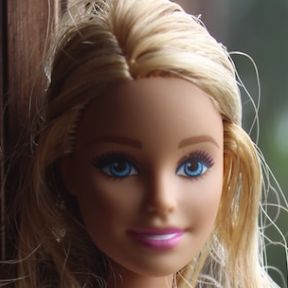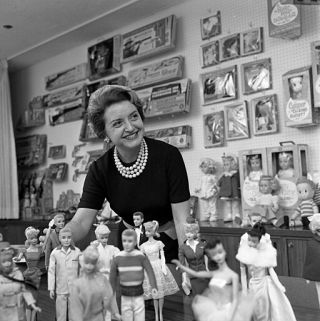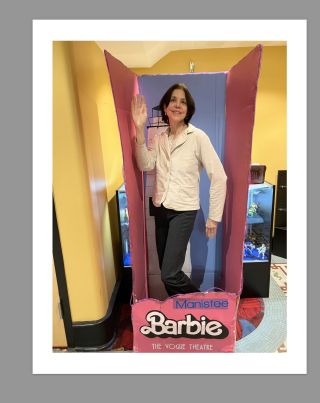GENDER- How the “Barbie” Movie Explains the Psychology of Patriarchy. Is patriarchy a toxic response to the discomfort of being human? Reviewed by Davia Sills

KEY POINTS-
- "Barbie" is an allegory of the rise of patriarchy.
- The film criticizes Mattel's patriarchal vision of female empowerment.
- "Barbie" is optimistic about our ability to refashion our world.
The Barbie movie begins with a parodic nod to Stanley Kubrick’s 2001: A Space Odyssey, where in the opening scene, the appearance of a black obelisk signals a milestone in the evolution of humankind—violence enters the community of peaceful apes who will now evolve into homo sapiens. In Barbie, the obelisk is replaced by Barbie (whose legs are equally monumental) and the apes by little girls who destroy their baby dolls; a new era in play has begun. This comic moment points to the different levels at which Greta Gerwig’s brilliant movie signifies: It’s a movie about dolls, to be sure, but also a movie about evolution, not simply that of dolls and play but also about the rise and endurance of patriarchy, seen through the lens of psychology.

The term “patriarchy” has been criticized for failing to acknowledge the oppression and injustice that exist within male identities. The film acknowledges this criticism when Aaron, the low-ranked administrator at Mattel, says, “I’m a man without power. Does that make me a woman?” But patriarchy is nevertheless grounded in gender, as bell hooks, who is well aware of identity-based power differentials, maintains: “Patriarchy is a political-social system that insists that males are inherently dominating, superior to everything and everyone deemed weak, especially females. ”
Barbie was created by Ruth Handler, a woman who defied the gender roles and restrictions of her time but who nevertheless designed a doll in which a limiting, oppressive ideal of female beauty prevails and whose character is all about her clothes and her body (see my essay “Barbie’s Body Project”).

Barbie’s impossible proportions advocate beauty standards (thinness above all) notorious for being internalized to the detriment of self-esteem and self-acceptance on the part of girls and women. Barbie’s feet make it impossible to move freely, from an attacker, or just to function. The first sign that there is a breach of boundaries between Barbieland and the Real World is that Barbie’s feet get flat; when she wears heels in this condition, she comments, “I would never wear heels if my feet were shaped like this.”
Let’s not be too hard on Handler; it was 1959, and in any case, as Gloria points out—she’s the Real World woman who caused the breach by imagining a line of Barbies in crisis—women internalize patriarchal ideals. The primarily male executives who ran Mattel after Handler elaborated on this inherent bias. Although women rule in Barbieland, it nevertheless embodies a patriarchal vision of a feminist universe since feminist theories do not advocate a simplistic reversal of privilege in which someone is still oppressed and disempowered. And with a few exceptions that aim at inclusiveness, the Barbies still look like Barbie.
The Kens of Barbieland are “women.” Ken #1 lives in a world where “Barbie has a great day every day, but Ken only has a great day if Barbie looks at him” (a description eerily reminiscent of abusive relationships). Ken lives in a psychological state of lack, a “life of blond fragility” where it “doesn’t seem to matter what I do/I’m always number two,” and where being second is tantamount to being nothing.

Barbie cruelly dismisses him; “every night is girl’s night,” to which he is pointedly not invited. He exists to partner with Barbie, and one of the happy outcomes of the film is that he learns to search for his identity apart from his persona as “and Ken,” as in “Barbie and Ken.” This secondary status, epitomized by Ken #1, accounts for the competition between the Kens, which exists from the start of the film. Humans compete when resources are scarce, the resources, in this case, being love, status, and recognition.
Sent off to entertain himself while Barbie tries to locate the source of the breach, Ken goes to Century City, where he discovers a world in which men rule. Barbie observes, “It’s almost like reverse here.” He acquires some simplistic ideas about patriarchy; in the Real World, it isn’t all that involved with horses and mini-fridges. But he understands its fundamental principles, and Gerwig makes it clear that they rule our world as well.
On her return to Barbieland, Barbie finds that Ken is in the process of turning it into a Kendom, thereby acquiring the respect and importance that he has lacked. And there’s an element of revenge as well, captured by one of his favorite songs, "Push" by Matchbox Twenty, with the signature line “I want to push you around.” Barbie finds that the Barbies have been brainwashed into supporting the patriarchal order of things, a comment on what happens to women in the real world (Handler and Barbie’s body come to mind). With the help of Gloria, Barbie figures out that the way to deprogram the Barbies is by stating the contradictions within patriarchal expectations for women. Barbie, who is becoming increasingly astute as well as human, observes, “By giving voice to the cognitive dissonance of living under patriarchy, you robbed it of its power.”
The Barbies trick the Kens into missing the vote to change the constitution that would make Barbieland into a Kendom by using competition between the Kens to provoke a battle. The battle is a comic fest (catch the guy giving mouth-to-mouth resuscitation to his hobbyhorse) that suddenly transforms into a brilliantly choreographed dance number; Gerwig was inspired by musicals of the 1940s. The transformation has meaning as well as spectacle, allegorizing the posturing—literal posturing through dance moves—and display so germane to patriarchy.

In case you miss the point about the psychology of patriarchy, it’s stated overtly but subtly in an almost throwaway line by Handler, who guides Barbie through her decision to become human. (This movie offers a wonderful rendition of the trope of “becoming human,” seen in characters like Pinocchio, the Tin Woodman (Wizard of Oz), and Data (Star Trek: The Next Generation.) Handler tells her that being human has its drawbacks. For one, you die: “Ideas live forever. Humans, not so much.” And “being a human can be pretty uncomfortable. Humans make up things like patriarchy and Barbie to deal with how uncomfortable it is.”
There’s the moral of the movie: We find both terrible and creative ways to deal with the inevitable lack and the awareness of that lack that come with being human. Handler also suggests that patriarchy is not biological or inevitable for humans, a counter-argument to a widely accepted belief (see works by Grenta Lerner and Angela Saini). Humans make up things, like patriarchy and Barbie. And what is made can be unmade. Maybe we’ll see “Ordinary Barbie” after all!
- Questions and Answers
- Opinion
- Story/Motivational/Inspiring
- Technology
- Art
- Causes
- Crafts
- Dance
- Drinks
- Film/Movie
- Fitness
- Food
- Jogos
- Gardening
- Health
- Início
- Literature
- Music
- Networking
- Outro
- Party
- Religion
- Shopping
- Sports
- Theater
- Wellness
- News
- Culture
- War machines and policy

